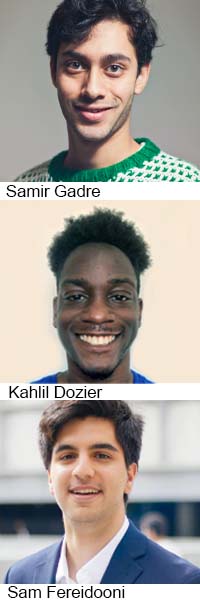PAR Program Offers Peer-Support to PhD Applicants
PhD students will review an applicant’s Personal Statement as part of the Pre-Submission Application Review (PAR) Program.
A group of PhD students wants to reduce the inequities in the department’s PhD application process. They will help applicants of the PhD program – by lending their expertise by reviewing a personal statement. This initiative, called the Pre-Submission Application Review (PAR) Program, is in its second year.
“It is clear that students from underrepresented groups may further benefit from mentorship through the entirety of the process of applying, to deciding, to ultimately entering grad school,” said Sam Fereidooni, a first-year PhD student and PAR Program coordinator. The group plans to organize further mentorship opportunities in future iterations of the program such as spaces where students can engage in conversations in a supportive community of their peers, in addition to current PhD students and faculty members.
 “Ultimately, we are trying to provide resources to support underrepresented people in CS, with the goal of addressing inequality in representation,” said Samir Gadre, a 2nd-year PhD student and PAR Program coordinator. The group sees the importance of continuing the program because the status quo does not change quickly. It is a feeling that is shared with other universities – Stanford University and the Massachusetts Institute of Technology students started similar programs in 2020 as well. Said Gadre, “We feel that PAR programs across the country are a good first step. However, we also recognize that more student and faculty activism, particularly from people in positions of power, is necessary to create meaningful institutional change.”
“Ultimately, we are trying to provide resources to support underrepresented people in CS, with the goal of addressing inequality in representation,” said Samir Gadre, a 2nd-year PhD student and PAR Program coordinator. The group sees the importance of continuing the program because the status quo does not change quickly. It is a feeling that is shared with other universities – Stanford University and the Massachusetts Institute of Technology students started similar programs in 2020 as well. Said Gadre, “We feel that PAR programs across the country are a good first step. However, we also recognize that more student and faculty activism, particularly from people in positions of power, is necessary to create meaningful institutional change.”
By continuing the program the group hopes to address the systemic disadvantages people from underrepresented communities face by lending a hand and giving advice on how to write a personal statement that will stand out and get the attention of professors.
“Above all applicants must do research on potential faculty that they would like to work with,” said Kahlil Dozier, a 2nd-year PhD student and PAR Program coordinator. Even if an applicant is not completely sure what their intended research area is, it is better to mention specific faculty that may align with their interests in their application. This is one of the most critical pieces of advice; an application will likely get referred to the names mentioned, and those professors may be the ones deciding if the applicant is a suitable candidate for admission.
And it is not enough to just mention the faculty in the application–potential students should actually look at the recent work faculty has done and read their papers. A PhD can take five to seven years to complete so applicants should see if it is the type of work they actually want to dedicate their graduate research career to. Continued Dozier, “If you have done this, it will inevitably come through in your personal statement and bolster your application.”
Here are more points applicants should consider before writing a Personal Statement:
– The Personal Statement is a key part of the application; oftentimes, it is where an applicant can differentiate themself from other applicants
– In short, the intent is to build a personal narrative, goals, and aspirations, and offer a perspective that is fundamentally absent from a resume/CV.
– The application is constrained by limited space, so applicants need to focus on a few concrete experiences (broadly defined) that may have shaped the trajectory of the applicant’s academic career up until this point or even themself as a researcher.
– Even though it is separate and serves a different function than the Research Statement of Purpose, research can still be involved. One approach to making a personal statement is to make a narrative out of one’s CV, fill in the “between the lines”.
– Again, doing prior research on potential faculty can shine through here, and it would be advantageous to show in any way how a faculty member’s work may align with the applicant’s background and goals.
Interested applicants have to apply to the PAR program and submit their personal statement and CV by November 7th at 11:59 pm EST. Because the program is student-run and dependent on volunteers, there is no guarantee that every applicant can be accommodated. Those who are accepted will be notified by November 14th, then paired with a PhD student in the same research area who will review their materials and provide feedback to them by November 21st – well ahead of the December 15th deadline to apply to the PhD program.
Published October 29, 2021


